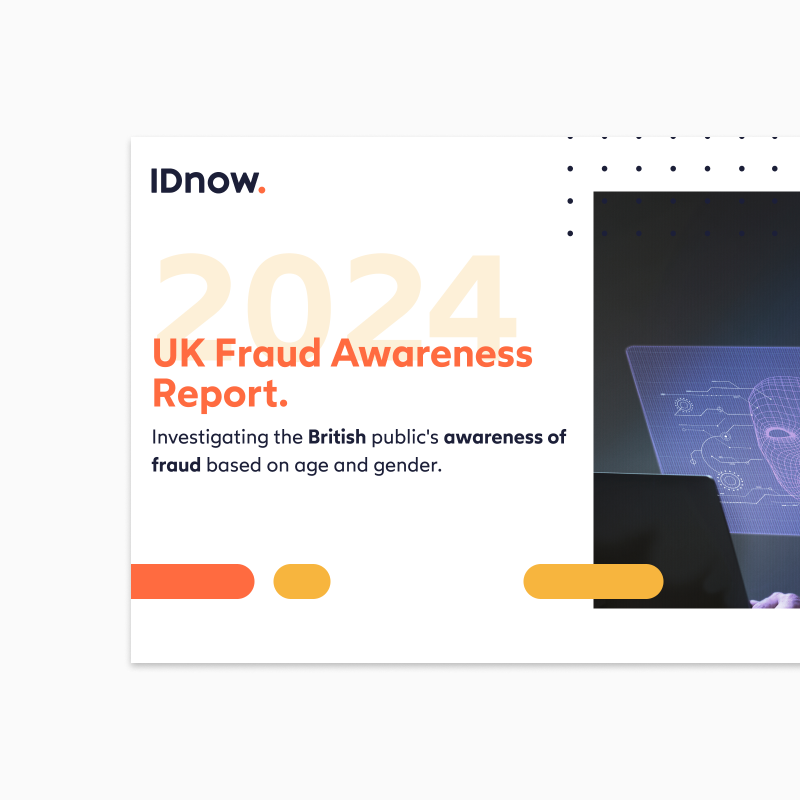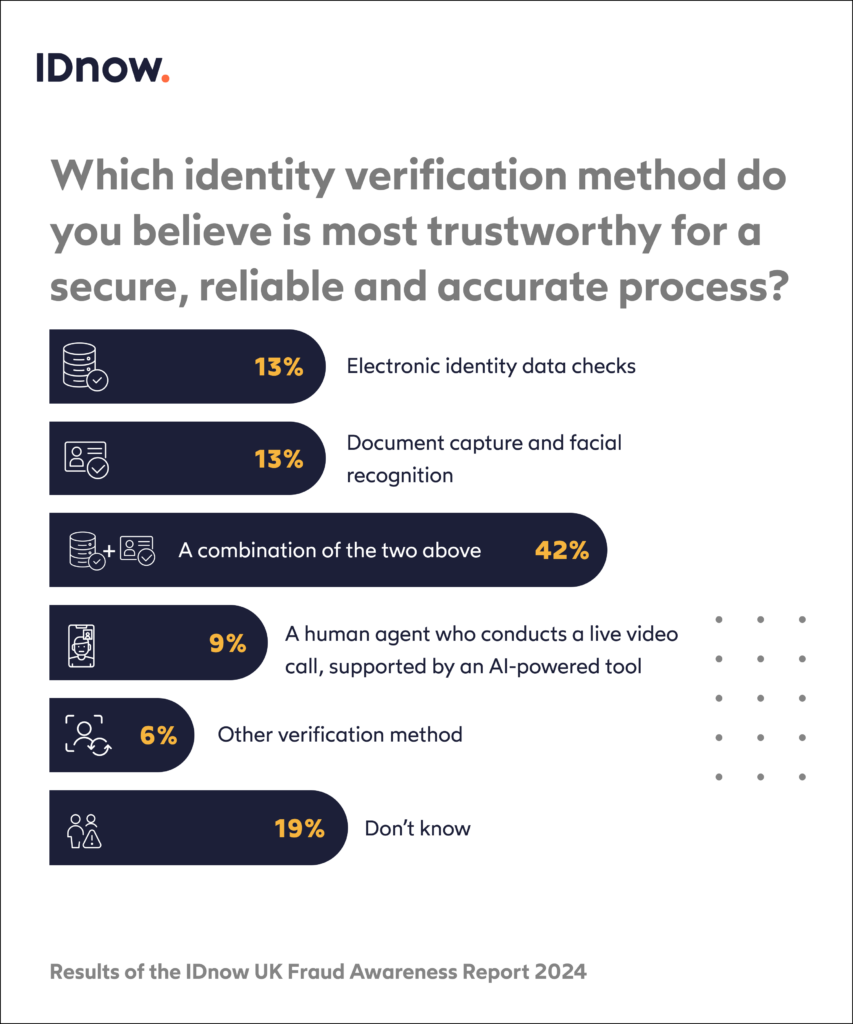IDnow explores the UK’s attitudes toward fraud prevention technology and the steps they’re taking to protect themselves.
Our recently released UK Fraud Awareness Report revealed worrying behavioral trends, such as a third of the public sharing ID documents via unencrypted channels and almost half of respondents not knowing what deepfakes were.
For an overview of the UK’s education gap when it comes to fraud, read our blog, ‘What does the UK really know about fraud?’
In the second of a three-part series, we explore the nation’s attitudes toward fraud-prevention technology and the steps Brits are willing to take to protect themselves.
Fight fraud with biometrics.
Biometric identification, such as automated facial recognition, is an optimal way of identifying business partners and customers, achieving security goals and complying with regulatory requirements. Our survey discovered that almost two-thirds of Brits (63%) were already using biometric technology, like fingerprint scans or FaceID, to access their online bank accounts, or approve bank transfers, with another 10% planning on using it in the future.
Less than a quarter of the population (24%) do not use biometric technology and do not plan on using it in the future.
UK Fraud Awareness Report 2024

Customer journeys: Start as you mean to go on.
The odd adage ‘start as you mean to go on’ rings true in every walk of life, especially in business, and especially at the beginning of a customer journey. Onboarding, the point at which the identity of the user is established and verified, is one of the most vulnerable stages for fraud. This is why service providers, especially banks or insurance companies, often establish more secure, but lengthier onboarding processes.
While speedy, seamless customer journeys are incredibly important, especially in the digital world, 75% of the UK population said they would be willing to go through lengthier online onboarding processes for accounts connected to larger sums or investments, if it made it safer.
In the UK, over £3 billion is lost to fraud every single year. According to our survey, while over half of Brits (54%) would move banks, if they were to become a victim of banking fraud, almost a quarter (24%) would remain loyal and stay with their bank, while another 21% were unsure what they would do in the event of banking fraud.
Lovro Persen, Director Document Management & Fraud at IDnow said that this should act as a wake-up call for traditional banks and fintechs that want to protect their customers, and in turn their business. ““Between deepfake videos and spoof texts that pretend to be from banks, it’s becoming harder for consumers to know what’s genuine and what is fraud. Meanwhile, huge amounts of data are stored online, making everyone ever-more vulnerable to data breaches.”
While technology can be a curse when it comes to tackling fraud, it also has the potential to be a solution to the problem.
Lovro Persen, Director Document Management & Fraud at IDnow.
Preferred identity verification methods.
The digital identity verification market has never been healthier. Most industries are either required by regulation to implement identity verification checks or have chosen to do to optimize processes or fight fraud. Such checks are required for account opening in Banking, compliance checks in Crypto, age verification in Mobility, streamlined check-in processes in Travel, financial risk checks in Gambling, and contract signing in Telecommunication.
Indeed, there were 61 billion digital identity verification checks conducted in 2023, a number that is predicted to grow by 16% to 71 billion by the end of 2024. In a world of just 8 billion people, these numbers are simply staggering.
Identity verification requires users to provide and have information associated with their identity verified. This may be a physical identity document, such as a driver’s license, passport, or a nationally issued identity document. Identity verification services can range from automated, expert-led to in-person. Each method fulfils different security, regulatory and convenience requirements.
There are numerous different methods of identity verification.
- Automated identity verification provides seamless 24/7 online experiences, enabling businesses to grow and scale with confidence, without compromising on security or data privacy. We offer extensive data checks from diverse and trusted sources, including official databases and credible records to confirm the existence of a legitimate identity in an intuitive and frictionless way. We also can validate more than 3,000 identity documents from 195 countries and growing. Our automated identity verification solutions leverage the latest in facial recognition and liveness technologies for seamless biometric verification, utilizing liveness, selfies and video to confirm the existence of an identity and that the person is physically present during the verification process.
- Expert-led video verification ensures optimal KYC customization while maintaining a balance between security and accessibility. Our face-to-face video verification with expert assistance allows businesses to compare photo taken during account creation process with photo from identity document. And, with liveness detection, you can add an additional layer of assurance to detect and protect against a variety of presentation attacks. Our specially-trained experts ask specific questions to identify social engineering. Expert-led identity verification can also help organizations improve inclusivity, accessibility, safety and convenience. Protect your most vulnerable customers and ensure they don’t miss out on the services they deserve.
- In-person identity verification enables your customers to have their identities verified at a public location, such as a gas station, near them. It also allows businesses to perform Point of Sale (POS) identification processes on-site. In-person verification ensures compliance with the German Money Laundering Act (GwG) and the Telecommunications Act (TKG) and a premium high-touch experience that doesn’t compromise on the speed and convenience of a digital solution.
Know Your Customer (KYC) processes are an integral part of identity verification and are crucial for businesses to protect their customers – and themselves – from fraudsters. KYC can ensure the power of identity is put back in the hands of the people it belongs to and the businesses they are trying to interact with.
According to the UK’s Fraud Awareness Report, the most popular method of identity verification in the UK is a combination of data checks and document / facial recognition. Although not particularly commonplace in the UK, 9% of Brits said they would trust a human agent conducting a live video verification call. In Germany, this is considered the most secure and accurate method of identity check, as the fraud expert can pick up emotional signs of distress or suspicious behavior.
Lastly, around a fifth (19%) of respondents do not know what method to trust the most, which reveals a deeper lack of understanding of the different verification methods, their benefits and their drawbacks. This is something that should be addressed as part of ongoing fraud education efforts.
Read all about the UK government’s Digital Identity and Attributes Trust Framework – a set of rules and standards designed to establish trust in digital identity products, in our blog, Why the UK is banking on digital IDs in 2023.
Discover the differences in public perception of fraud and identity verification in France and the UK in our blog, ‘France vs UK. Which country knows more about fraud?’
Or, interested in how fraud trends and fraud prevention has changed over the years, read our interview with ex CID officer, Paul Taylor.
By

Jody Houton
Senior Content Manager at IDnow
Connect with Jody on LinkedIn




